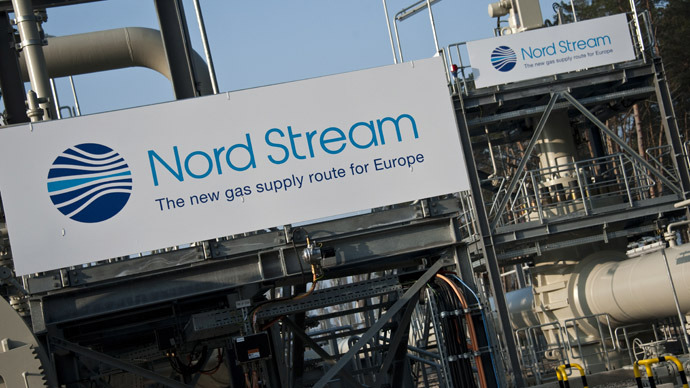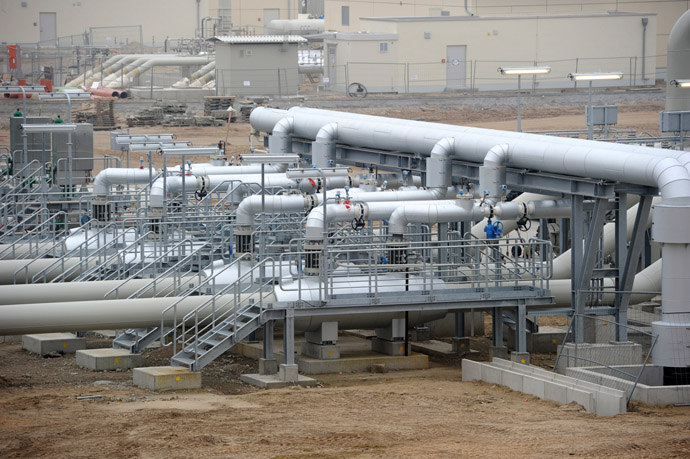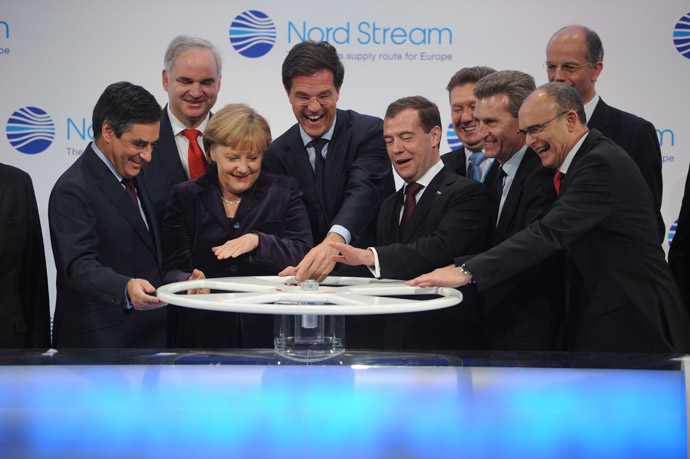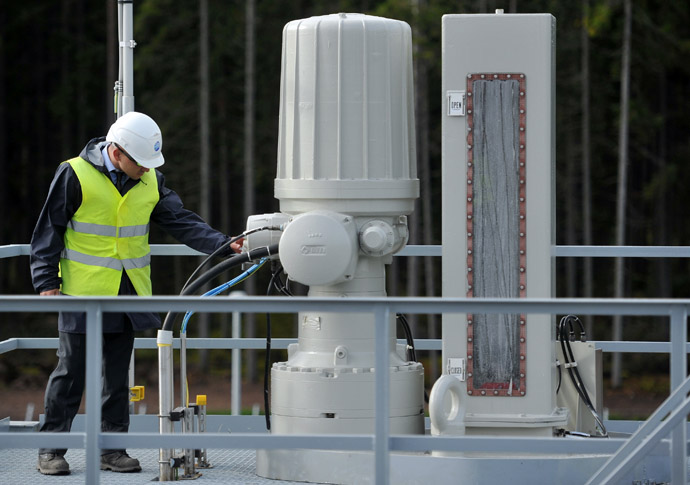'Russia's gas status quo in Europe won’t be affected by new suppliers'

New natural gas suppliers to Europe won’t affect Russia’s status quo due to existing infrastructure and flexible pricing, the president of Russian oil giant Lukoil told RT in an interview. He also revealed country’s Middle East expansion plans.
“Gazprom will retain its share on the European market thanks to the infrastructure it has set up over decades and the flexible pricing policy”, said Vagit Alekperov.
Also, he believes that producers and consumers have“struck a delicate balance between profits and a comfortable price tag.”
RT: Some say that Gazprom has missed the shale gas revolution. Has Lukoil missed it too?
Vagit Alekperov: No, we need to look at history. It is a historical fact that shale is rich in hydrocarbon. Everybody knew that and has been using shale industrially. There is a town named Slanets, which means shale in Russian, near St. Petersburg. Shale has been mined there for a long time. It was used for making hydrocarbon based lubricants. Of course, it is a great achievement on the part of US engineers that America is now producing oil and gas from shale. In order to do it, they had to drill very tricky wells and do hydraulic fracturing. This way they’ve been able to cut the cost of producing this gas and liquid hydrocarbons from these layers. Undoubtedly, this is an achievement, but I wouldn’t call it a revolution.
Of course, shale gas can be found in other countries as well, but there are many other issues to consider here – density of population living on these fields and having the level of oil service they have in the US. I think that it is important to develop all types of energy. All deposits of hydrocarbons should be developed, and we have to look for more efficient technology. For example, we are working in the Bazhenov formation, which is a very tricky field. It is similar to shale fields in the US. So we use this kind of technology in Russia all the time. We are convinced that as we develop fields like the Bazhenov formation or the Domanic-type formation in the Perm Region, we will use this shale technology.

RT:The Arctic shelf issue is very popular in Russia today. But there is uncertainty about oil prices, whereas development of the Arctic shelf requires huge investments. So some say that maybe this project should be postponed. Maybe right now it would make sense to focus on shale, if it’s not as expensive and could yield immediate results, like it has in the US?
VA: I have always said that all gas and oil deposits in Russia should be explored and listed as the nation’s fixed assets. This is our potential, our country’s future. It’s up to the president and the government to decide when to develop these fields. Unfortunately, current Russian legislation doesn’t allow private and foreign companies to invest significantly into geological exploration of the Arctic seas. There are several reasons for these laws – environmental issues, defense considerations, because some military facilities were based there. But we think that this legislation should be adjusted. Private companies, Russian companies should be able to conduct exploration of the Arctic shelf.
RT:What do you think about Gazprom possibly losing its monopoly over the export of LNG?
VA: Negotiations are underway. This issue is actively discussed in Russia. Novatek, which began the construction of its LNG plant in Russia’s Far North, initiated the discussion. Rosneft is also involved in the talks – this company is involved in some major projects on the Arctic shelf and wants to be able to export its products. Our company has not considered building LNG plants. We have a long-term contract with Gazprom – and at this point, this company meets all our requirements. We want to have a solid partnership with the gas monopoly. We would like to keep our rate of return at the level we have now, when we sell gas to them.
RT:But if this happens, don’t you think Russian companies will compete against each other on the market? Russian gas companies will compete with each other in Europe or elsewhere.
VA: I think LNG will be sold to European and Asian markets. So, I don’t expect tough competition today, because Europe already has LNG regasification terminals. If Russia does not supply gas to this market, other suppliers will. So, we have to carefully consider whatever steps we take. Of course, we should not allow internal competition.
RT:What is the current situation with the Norwegian shelf project? Are you making progress with negotiations?
VA: We have submitted our application, and we have been accepted as operators. We have cleared all the procedural issues with the Norwegian authorities. We hope that there will soon be a tender, and together with our Norwegian partners we will submit our bids.

RT:How much are you going to invest there?
VA: It’s hard to say at this point because we are still at the exploration stage. Exploration usually does not require a lot of investment. We hope to keep it under US$200 million.
RT:What will you do if Lukoil loses its privileged status in developing Caspian Sea fields? Because the Russian government may postpone the adoption of the law regulating this matter.
VA: Lukoil cannot lose its privileged status because it doesn’t have any. What we have is a special tax rate for developing Caspian Sea fields. The law was adopted in December and will go into effect on April 1. There is a hitch because of two conflicting laws that has cost us two or three months. We hope that they will make necessary adjustments in April or May, while new procedures for taking decisions under the new law are being approved, and the energy minister has confirmed to us that this is indeed what is going to happen. In other words, the new law has a provision about the Caspian Sea fields that we develop. So, we hope that all these things are in sync, so as to avoid financial losses.
RT:The Iraqi oil minister said that they are planning to invest $173 billion in the national oil sector. How can that impact Lukoil’s operations in that country?
VA: We have been very active in Iraq. West Qurna-2, a major Iraqi oil field, is on track to start producing late this year or early next year. We are about to begin exploration work on the Block 10 field with our Japanese partners. We are also eyeing the Nasiriyah oil field project. Lukoil has extensive experience of working in Iraq: we have set up the infrastructure and built a team that is well-adapted to the operations on this territory. So if the government goes ahead with the tender on Nasiriyah, we will take part in – provided that the terms are acceptable for Lukoil.
So this is investment in the industry, it’s really huge, also because the country boasts enormous reserves. This is what makes international energy companies so interested in Iraq.
RT:You mentioned the Nasiriyah oilfield - do you plan to develop it alone or in an alliance with a partner?
VA: Alliances are possible.

RT:With Russian or foreign companies?
VA: It could be either Russian or foreign companies. We are ready to set up a partnership. In fact, we have partnership relations with all the world’s biggest companies.
RT:Why is it taking you so long to find a partner for West Qurna-2? It’s been reported that Chinese producers were among the candidates.
VA: Let me make it absolutely clear – we are not looking for a partner. A number of companies are seeking partnership with us on this project. But we have already gone through the most challenging stage in West Qurna-2 – we have built a dedicated team, designed the security system, picked the contractors, cleared all the procedural issues with the Oil Ministry and South Oil Company. So today we are on the final stretch. The field will go on stream as early as next year. We’ll have all the infrastructure up and running. However, if there’s an investor who can make us a lucrative offer or make sure there’s a specific market ready to buy our giant oil supplies, we would only welcome such a partner.
RT:So there have been no good offers so far, right?
VA: We did receive some offers from Chinese companies. We are in talks, but for the time being we are still carrying out the project on our own.
RT:Can you give any deadline?
VA: No. A partnership might be as well struck after it goes on stream or during its operation. It’s also possible that we will go on without a partner.
RT:What’s your take on the potential natural gas supplies from Kurdistan to Europe via Turkey through the Trans-Adriatic Pipeline?
VA: I think Iraq’s natural gas could be supplied via Turkey, because Iraq boasts large gas reserves. But gas fields are at the initial stage of development, with tenders held only recently. This is a promising area but I would say it’s more long-term.
RT:How will it affect Russia’s plans?
VA: Any new supplier of natural gas to Europe will definitely affect the status quo. But I am sure that Gazprom will retain its share on the European market thanks to the infrastructure it has set up over decades and the flexible pricing policy.

RT:Lukoil has been conducting exploration works in Saudi Arabia for some years year. The government is expected to decide on the future of the gas-condensate field by the year’s end. What’s the cause of the delay?
VA: Negotiations are underway. Let me remind you that we discovered a large gas field, and we estimate its reserves at some 300 billion cubic meters. But this is a field with complex geological properties, based on low producing formations. And so its development requires the use of special technology. This will drive up the costs and capex [capital expenditure]. So today, together with our partner, Saudi Aramco, and the Oil Ministry, we are discussing the business model for this field. We are about to begin drafting the blueprint for this field, and we hope to come up with a solution that would make this project economically viable. So far the talks have been positive.
RT:Is this for the domestic market or will it be exported?
VA: It will be consumed domestically. Under our contract, Saudi Arabia will buy the full volume for its own needs.
RT:What are Lukoil’s plans in Lebanon?
VA: We are now forging a consortium with Total. It will be the operator while we will be among the participants of the project. We have a minority share – just above 20 per cent. Generally, we consider the East Mediterranean as a very promising region and are ready to look at different projects. After the discoveries made in Israel and Cyprus we can now hope for potential fields on the Lebanon shelf.
RT:What’s the capex plan?
VA: It will be pretty modest because the first stage includes only exploration – drilling at one or two sites.
RT:What your forecast for the oil prices for this year?
VA: We view the current range – between $110 and $120 – to be a fair price. It’s okay both for oil producers – they get enough cash to invest into exploration and deepwater field development. It’s also okay for the consumers who get adapted to the price. Just look at what’s happening in Europe, in Russia or elsewhere in the world. We are not seeing any social tension over the price of fuel. It means that this price is acceptable for our customers. It means we have struck a delicate balance between the profits we need for investment into new fields and a comfortable price tag for consumers.
RT:What’s your short-term forecast?
VA: We are expecting that the commodities will continue to be volatile. Some agencies predict a hike to $125-140, others keep the range at $105-115. I guess the worst job for an analyst is to make a forecast for the oil prices.
The statements, views and opinions expressed in this column are solely those of the author and do not necessarily represent those of RT.












